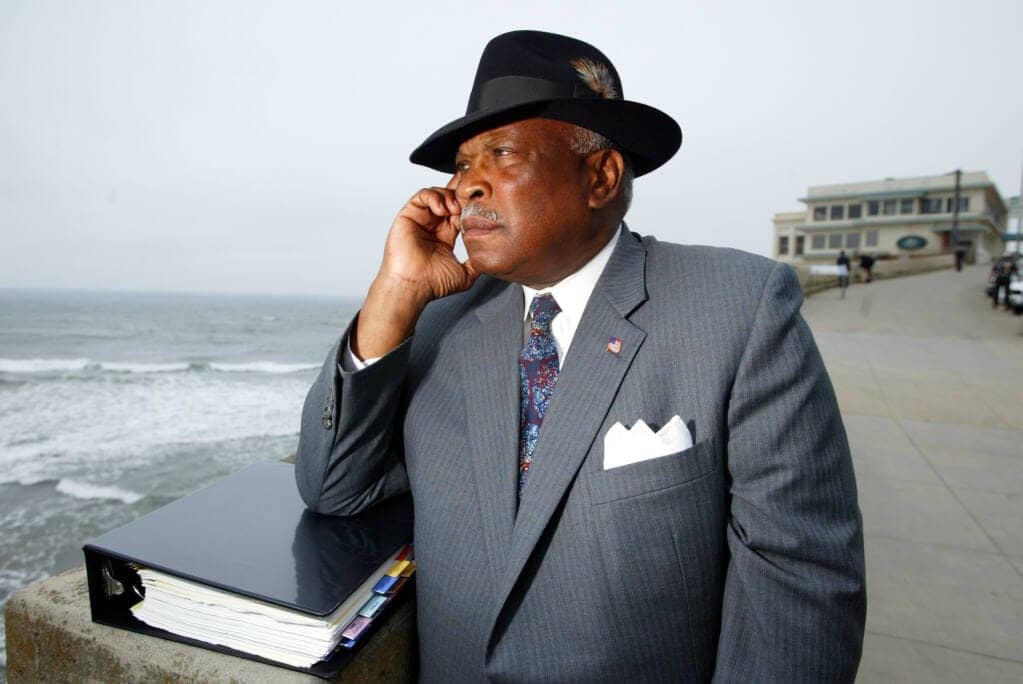Earl Sanders, San Francisco’s first Black chief, dies
Transitioning to the Ancestors, San Francisco’s first Black Police Chief, civil rights and police accountability advocate, teacher, expert witness, family man and friend, Earl Sanders leaves a legacy of courage, respectability, accountability and authenticity – and deep convictions like “wrong is wrong” no matter who you are. Rest in Peace, Earl Sanders. The post Earl Sanders, San Francisco’s first Black chief, dies appeared first on San Francisco Bay View.


by John Burris, Esq.
I knew Earl Sanders for over 30 years and knew of him before that because he was a steadfast civil rights advocate both for Black officers and the African American community. As a civil rights advocate fighting against police abuse, Earl’s commitment to social justice was unflinching even though his attitudes caused concerns among his fellow officers.
Even so, we spoke often about police abuse and the challenges of fighting against it. Before he became chief, he was an expert witness in many of my cases where he challenged police officers’ misconduct; and even though he was viewed as a “turncoat” by many fellow officers, he maintained that “wrong is wrong,” whether done by cops or not.
Long before he became a leader in the San Francisco Police Department, he was fighting for equal justice and employment opportunities for African Americans. He formed the Officers for Justice, a Black police officers association that sued the department for discriminating against Blacks in hiring and promotions.
He was at the forefront of the civil rights movement within the department, advocating for more Black police officers and better treatment of the community by San Francisco police officers. Later, when he became a homicide detective, he, along with his partner Napoleon Hendrix, were legendary in solving crimes and protecting the community against violent criminals.

His most famous case was the Zebra case where it was alleged that four young African American men were on a killing spree randomly killing mostly white people around the Bay Area. He and his partner were instrumental in solving the highly publicized case. Later when he became police chief and a scandal not of his making occurred, he was resolute in his claims of innocence. I was honored to represent him, and the case was thrown out.
Earl was a pioneer and history maker and his impact on policing in San Francisco will be felt for generations.
Nationally acclaimed civil rights attorney John Burris has used his extraordinary legal skills and brilliant strategy to win justice in case after case that others believed unwinnable. The recipient of countless awards, from the National Bar Association’s highest award to the Dr. Huey P. Newton Trail Blazer & Legacy Award to Keepers of Our Culture, he can be reached at 510-839-5200 or by writing to his law office at 7677 Oakport St., Suite 1120, Oakland, CA 94621.
Obituary
by Duggans Mortuary
Earl Sanders was born on Oct. 12, 1937, in Houston, Texas, to George Sanders and Kissie Macana Baxter. Earl spent his early childhood in Texas and relocated with his mother to Los Angeles, California, where he lived until his mother’s passing when he was 14.
After losing his mother, Earl moved himself to San Francisco and began building an exceptional life in the city he loved so much. Armed with a passion for education, Earl graduated from George Washington High School, City College of San Francisco and Golden Gate University, earning a bachelor’s and a master’s degree in public administration of justice. Earl later went on to study at Harvard University’s John F. Kennedy School of Public Policy.
On July 16, 1960, Earl married Espanola Wiley. To this union, two children were born: Marcus Adrian and Marguerite Suzette. A loyal and supportive family man, Earl adored his family and was always an outstanding provider and staunch advocate for his children and grandchildren.
In 1964, Earl began an illustrious career with the San Francisco Police Department that would span nearly 40 years. For 25 years Earl was a renowned homicide inspector, investigating and solving many of San Francisco’s most infamous homicide cases. He also taught criminal investigation and lectured widely on civil rights and community-police relations. His professional excellence and dedication resulted in Earl becoming San Francisco’s first African American chief of police.
Always a gracious gentleman, Earl was well known for being a pillar of the community. A renaissance man, Earl was an avid reader, enjoyed gourmet cooking and, as an accomplished outdoorsman, was a skilled fisherman and hunter.
Earl passed peacefully on Jan. 11, 2021. He was preceded in death by his beloved wife of 58 years, Espanola; his parents, George Sanders and Kissie Baxter; and his brothers, Andrew Sanders and William Lacy. Earl is survived by his two children, Marcus Sanders and Marguerite Sanders Carmichael (Eric Carmichael); three grandchildren, Prentice Landon Sanders, Jessica Sanders and Bailey Sanders; aunt, Mary Baxter Simpkins; brother in law Calvin Wiley (Maria Wiley); and sisters in law Mercedes Wiley Pinkard (Robert Pinkard), Gerlie Wiley, Joy Wiley and Mary Jane Wiley; and a host of nieces, nephews, cousins, other relatives and dear friends.
The post Earl Sanders, San Francisco’s first Black chief, dies appeared first on San Francisco Bay View.







